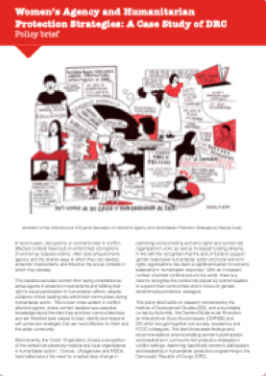Women’s Agency and Humanitarian Protection Strategies: DRC
This policy brief draws on recent research in the Democratic Republic of the Congo to call for donors, governments and humanitarian actors to enable and support women’s participation and leadership in community-led protection strategies in conflict settings.
Executive summary
In recent years, there has been a recognition from donors, UN agencies and INGOs about the need to partner with and promote women’s-rights organisations’ (WROs) work as well as the need for increased funding. Despite this recognition, the international community continues to insufficiently fund gender-responsive humanitarian action and local WROs and this has been a significant barrier to women’s leadership in humanitarian response to date.
Women and their organisations are still not seen as leaders in humanitarian action, even though they have essential knowledge about the risks they and their communities face, and are therefore best placed to lead and develop protection strategies that are most effective for them and the wider community.
This policy brief builds on research conducted by the Institute of Development Studies (IDS), and a roundtable co-led by ActionAid, the Centre d’Etude et de Promotion en Interventions Socio-Economiques (CEPRISE) and IDS which brought together civil society, academics and FCDO colleagues. The brief showcases findings and recommendations around enabling women’s participation and leadership in community-led protection strategies in conflict settings, examining specifically women’s participation and leadership in humanitarian protection programming in the Democratic Republic of Congo (DRC).
